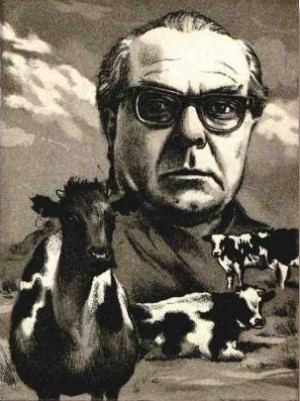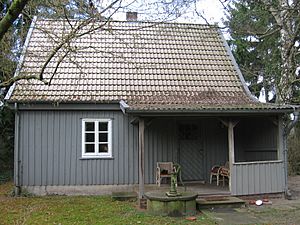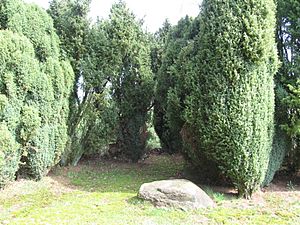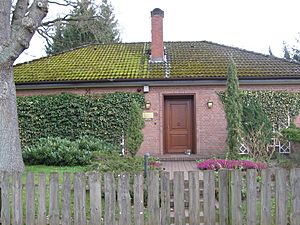Arno Schmidt facts for kids
Arno Schmidt was a German author and translator. He was born on January 18, 1914, and passed away on June 3, 1979. Not many people outside of Germany know his work. This is partly because his books are very hard to translate into other languages. Even though he isn't super famous in Germany, many critics and writers think he was one of the most important German writers of the 20th century.
Contents
Arno Schmidt's Life Story
Arno Schmidt was born in Hamburg, Germany. His father was a police officer. In 1928, after his father passed away, Arno and his mother moved to her hometown of Lauban. This town is now in Poland. He went to school in Görlitz and also attended a trade school there.
After school, he was without a job for a few months. Then, in 1934, he started an apprenticeship at a textile company. He learned about business there. After finishing his training, the company hired him as an accountant. Around this time, he met Alice Murawski, who would become his wife. They got married on August 21, 1937, and did not have any children.
World War II and Moving West
When World War II began in 1939, Schmidt joined the German army, called the Wehrmacht. Because he was good at math, he worked in the artillery. He served in Alsace first, and after 1941, he was in Norway, which was a quieter area.
In 1945, as the war was ending, Schmidt volunteered for duty in Northern Germany. He did this to get a short visit home. He knew the war was lost. So, he used this visit to help his wife and himself escape to western Germany. They wanted to avoid being captured by the Red Army. The Red Army was known for treating prisoners and civilians very harshly. Schmidt surrendered to British forces in Lower Saxony.
As refugees, Schmidt and his wife lost almost everything they owned. This included their beloved collection of books.
Starting a New Life as a Writer
After being a British prisoner of war and then working as an interpreter, Schmidt began his career as a full-time writer in 1946. His old home in Lauban was now part of Poland. So, Schmidt and his wife were among millions of refugees who moved to different places in West Germany.
During this difficult time, they were very poor. His sister, Lucie, who had moved to the US, sent them CARE Packages. These packages helped them survive. The Schmidts lived in several temporary homes. They faced some legal trouble in Kastel-Staadt because of his writings. This was in a Catholic area of Germany. As a result, they moved to Darmstadt, a Protestant city, where the case against him was dropped.
In 1958, the Schmidts moved to a small village called Bargfeld. They lived there for the rest of their lives. Arno Schmidt passed away in 1979, and his wife Alice died in 1983.
Arno Schmidt's Writing Style
Arno Schmidt was a very independent thinker. He had a very gloomy view of the world because of his experiences in Nazi Germany. In his 1951 book, Schwarze Spiegel (Dark Mirrors), he imagined a future world that was empty after humans had caused a disaster. He believed the world was created by a monster called Leviathan. He thought this monster passed its aggressive nature to humans.
His writing style was very special. He used everyday language in a clever and funny way. This made many people admire his work. He also created his own way of spelling words. He believed this spelling would show the true meaning of words and how they were connected. For example, he would write “Roh=Mann=Tick" instead of "Romantik" (Romanticism). He thought this showed that romanticism was a "craze of unsubtle men." He called these "atoms" of words, which held the original meaning, "Etyme" (etyms).
Zettel's Dream
Schmidt explained his idea of "etyms" in his most important work, Zettels Traum. This book is about an older writer who thinks about the works of Edgar Allan Poe. The writer's thoughts flow freely, like a "stream of consciousness." He also talks about a Poe translation with two other translators and flirts with their teenage daughter. Schmidt himself also translated Edgar Allan Poe's works from 1966 to 1973, working with Hans Wollschläger.
Some critics at first said Zettel's Traum was not art or just nonsense. They even called Schmidt a "psychopath." But over time, people have changed their minds. Schmidt is now seen as an important, though very unusual, German writer of the 20th century.
Other Works
In the 1960s, Arno Schmidt wrote many plays for German radio stations. These plays talked about authors who were forgotten or not well-known, but who Schmidt thought were very good. Some of these authors included Johann Gottfried Schnabel and Karl Philipp Moritz. These "plays" were mostly discussions about literature with a few people. They also included voices for quotes. Schmidt even used his own voice for parts of his translations of Finnegans Wake. Eleven of these "Radio-Essays" were released on audio CDs in 2003.
Later Years
In 1971, Schmidt was nominated for the Nobel Prize in Literature. This was a big honor!
However, not many copies of Schmidt's books were sold. He once said that he only wrote for a small group of people who could truly understand his work. Because of this, he lived in great poverty. In his last few years, a writer and scholar named Jan Philipp Reemtsma helped him financially. Reemtsma was the heir to a German cigarette company. Arno Schmidt passed away in a hospital in Celle on June 3, 1979, after having a stroke.
Arno Schmidt's Legacy
Dalkey Archive Press has re-released five of Schmidt's books that were translated by John E. Woods. These books include Collected Novellas, Collected Stories, Nobodaddy's Children, Two Novels, and Bottom’s Dream (which is Zettel’s Traum). These re-releases were planned to happen at the same time as "Rediscovering Arno Schmidt" events in the US, UK, and Europe.
The Arno Schmidt Foundation (Arno Schmidt Stiftung) is located in Bargfeld. It is supported by Jan Philipp Reemtsma. This foundation is working to publish all of Arno Schmidt's complete works.
Arno Schmidt Prize
The Arno Schmidt Prize was given out by the Arno Schmidt Foundation from 1981 to 1988. The prize was worth 50,000 German Marks (about €25,000). It was only awarded four times:
- 1982: Hans Wollschläger
- 1984: Wolfgang Koeppen
- 1986: Peter Rühmkorf
- 1988: Karlheinz Deschner
After 1988, the prize was changed into a scholarship. This scholarship is given every two years and is worth 36,000 euros.
Arno Schmidt Scholarship Winners
- 1992/1993: Ulrich Holbein
- 1994/1995: Andreas Eschbach
- 1996/1997: Werner Kofler
- 2000/2001: Kurt Drabert
- 2000: Georg Martin Oswald
- 2002/2003: Friederike Kretzen
- 2005/2006: Reinhard Jirgl
- 2007/2008: Werner Fritsch
- 2015/2016: Andreas Maier
- 2018/2019: Georg Klein
See also
 In Spanish: Arno Schmidt para niños
In Spanish: Arno Schmidt para niños
 | Aaron Henry |
 | T. R. M. Howard |
 | Jesse Jackson |





